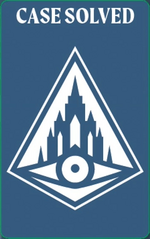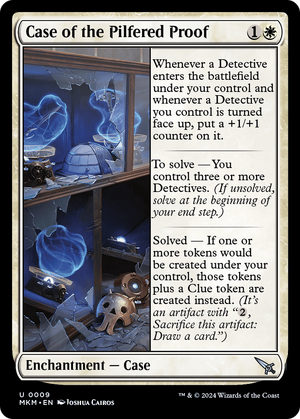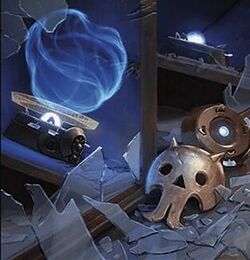Case
| Case | |
|---|---|
| Enchantment Type | |
| (Subtype for enchantment cards) | |
| Introduced | Murders at Karlov Manor |
| Last used | Murders at Karlov Manor |
| Scryfall Statistics | |
|
15 cards | |
Case is an enchantment type that appears on Case cards introduced in Murders at Karlov Manor.[1][2] They represent mysteries to solve, and thus far all begin their name with "Case of the...", like classic detective stories. Case cards are the third card variety to use a vertically-oriented card frame.
Description
Like Sagas and Classes before them, Cases have a tall, skinny image on the left, and rules text on the right with striations to visually indicate increasing power level. All three of these are enchantment types, whereas leveler cards and station cards are equivalents for creatures. Cases evolved from ideas for a "Quest" mechanic first explored for Zendikar.[2] Cases use a special solved designation to track the achievement of an objective, while Zendikar ultimately used quest counters for a similar purpose.

Cases have three abilities. The first is a standard ability, which works just as it would on any other enchantment, with no additional rules attached to it. This ability is always active for its controller, regardless of whether or not the case is solved.
The second ability is the "To solve" ability: it lists a condition that must be true at the beginning of the controller's end step for the case to become solved. This is a triggered ability that uses "intervening if" rules, so it only triggers if the condition is already met as the end step begins, and opponents have the opportunity to "sabotage" its conditions before it resolves.
The third ability is the "Solved" ability, which is like any other ability except that it only functions if the case is solved. In other words, Solved abilities on an unsolved Case can't be activated or trigger, and apply no effects statically. Note that the Solved ability is different from the solved designation; having the ability does not mean the case is solved yet.
Being solved is a designation that is either true or not with no interactions with other mechanics, much like Classes and their levels. Players may use physical markers to remind themselves a case is solved, but these should not be confused with counters mechanically. A punch card with "Case Solved" indicators appears in booster packs for Murders at Karlov Manor.[3]
Rules

From the glossary of the Comprehensive Rules (November 14, 2025—Avatar: The Last Airbender)
- Case
- An enchantment subtype. Cases have a “to solve” ability that set a condition its controller must meet in order for the “solved” ability to take effect. See rule 719, “Case Cards.”
From the Comprehensive Rules (November 14, 2025—Avatar: The Last Airbender)
- 719. Case Cards
- 719.1. Each Case card’s illustration is vertically oriented on the left side of the card, and its type line is along the bottom of the card.
- 719.2. The Case frame has no additional rules meaning.
- 719.3. Case cards have two special keyword abilities that appear before a long dash and represent a triggered ability and an ability that may be static, triggered, or activated.
- 719.3a “To solve — [Condition]” means “At the beginning of your end step, if [condition] and this Case is not solved, this Case becomes solved.”
- 719.3b Solved is a designation a permanent can have. It has no rules meaning other than to act as a marker that spells and abilities can identify. Once a permanent becomes solved, it stays solved until it leaves the battlefield. The solved designation is neither an ability nor part of the permanent’s copiable values.
- 719.3c If a Case has the solved designation, “Solved — [Ability text]” is an ability that may affect the game if it’s a static ability, it may trigger if it’s a triggered ability, and it can be activated if it’s an activated ability. See rule 702.169, “Solved.”
Rulings
From the Release Notes for Murders at Karlov Manor (January 25, 2024)[4]
- The first ability of a Case is always active.
- Each Case has two special keyword abilities: to solve and solved.
- "To Solve — [condition]" means "At the beginning of your end step, if [condition] and this Case is not solved, it becomes solved."
- The meaning of "solved" differs based on what type of ability follows it. "Solved — [activated ability]" means "[Activated ability]. Activate only if this Case is solved." Activated abilities contain a colon. They're generally written "[Cost]: [Effect]."
- "Solved — [Triggered ability]" means "[Triggered ability]. This ability triggers only if this Case is solved." Triggered abilities use the word "when," "whenever," or "at." They're often written as "[Trigger condition], [effect]."
- "Solved — [static ability]" means "As long as this Case is solved, [static ability]." Static abilities are written as statements, such as "Creatures you control get +1/+1" or "Instant and sorcery spells you cast cost
less to cast."
- "To solve" abilities will check for their condition twice: once when the ability would trigger, and once when it resolves. If the condition isn't true at the beginning of your end step, the ability won't trigger at all. If the condition isn't true when the ability resolves, the Case won't become solved.
- Once a Case becomes solved, it stays solved until it leaves the battlefield.
- Cases don't lose their other abilities when they become solved.
- Being solved is not part of a permanent's copiable values. A permanent that becomes a copy of a solved Case is not solved. A solved Case that somehow becomes a copy of a different Case stays solved.
From Blogatog (January 27, 2024)[5]
- You can solve Cases on future turns, not just the turn you cast it.
References
- ↑ Matt Tabak (January 16, 2024). "Murders at Karlov Manor Mechanics". magicthegathering.com. Wizards of the Coast.
- ↑ a b Mark Rosewater (January 22, 2024). "Getting Away with Murders at Karlov Manor, Part 2". magicthegathering.com. Wizards of the Coast.
- ↑ Murders At Karlov Manor Debut Aftershow. (Video). Magic: The Gathering. YouTube (January 16, 2024).
- ↑ Eric Levine (January 25, 2024). "Murders at Karlov Manor Release Notes". magicthegathering.com. Wizards of the Coast.
- ↑ Mark Rosewater (January 27, 2024). "I got this real nitpick of a player who insists that you have to solve Cases the turn you cast it, not on a future turn.". Blogatog. Tumblr.
